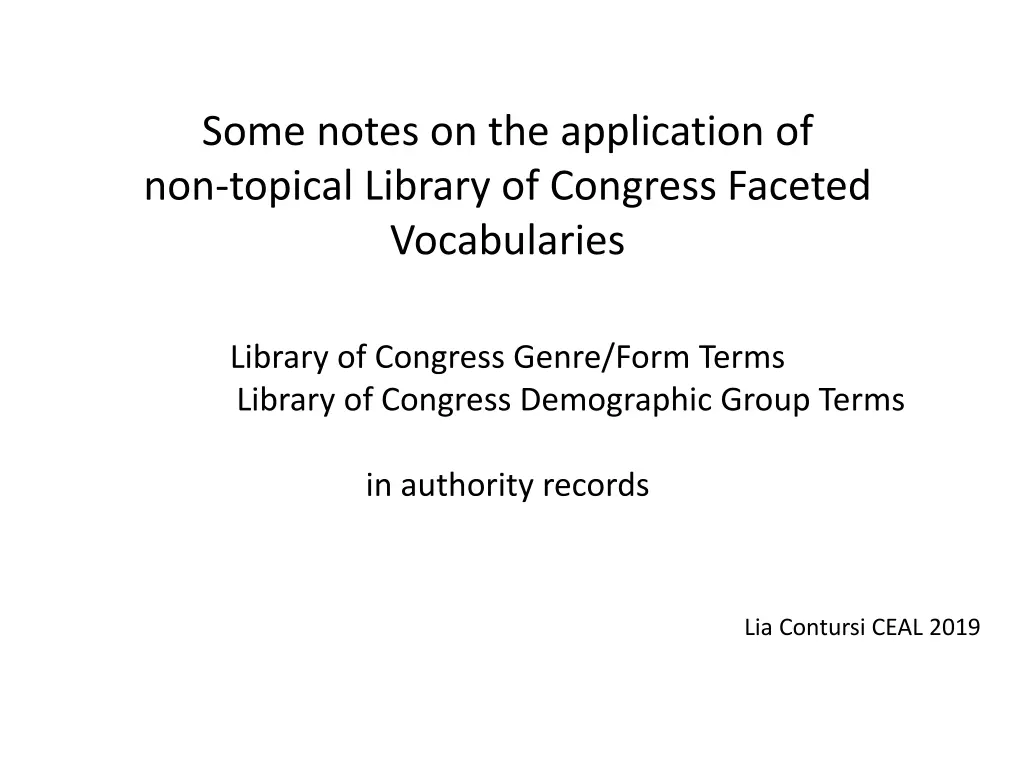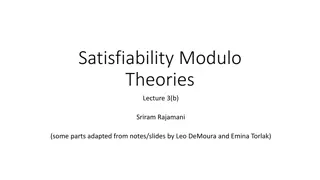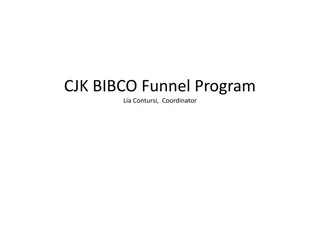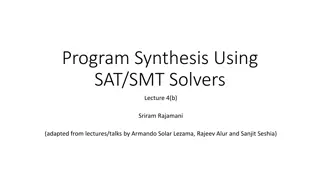
Insights on Non-Topical Library of Congress Vocabularies & Gender Recording Best Practices
Explore the application of Library of Congress vocabularies in authority records, along with guidelines for recording gender information. Learn about the first women to hold significant legal positions and the importance of accurate gender representation in name authority records.
Download Presentation

Please find below an Image/Link to download the presentation.
The content on the website is provided AS IS for your information and personal use only. It may not be sold, licensed, or shared on other websites without obtaining consent from the author. If you encounter any issues during the download, it is possible that the publisher has removed the file from their server.
You are allowed to download the files provided on this website for personal or commercial use, subject to the condition that they are used lawfully. All files are the property of their respective owners.
The content on the website is provided AS IS for your information and personal use only. It may not be sold, licensed, or shared on other websites without obtaining consent from the author.
E N D
Presentation Transcript
Some notes on the application of non-topical Library of Congress Faceted Vocabularies Library of Congress Genre/Form Terms Library of Congress Demographic Group Terms in authority records Lia Contursi CEAL 2019
DCM-Z1 374 Occupation
First American woman to act as attorney in court 374:##:$a Lawyers $2 lcdgt
First American woman to serve as state supreme court judge 374:##:$a Judges $2lcdgt
First Native-American woman to serve as federal judge [occupation already applied] 374:##:$a Lawyers $a Judges $2 lcdgt
Japanese woman lawyer and first Japanese woman judge 374:##:$a Judges $2lcdgt
DCM-Z1 375 Gender Report of the PCC Ad Hoc Task Group on Gender in Name Authority Records
Report of the PCC Ad Hoc Task Group on Gender in Name Authority Records [p. 2] Best Practices for Recording Information about Gender Record information about gender as the person self-identifies and explicitly discloses, taking information from readily and publicly available sources such as: Biographical information published on the resource Biographical information provided by the publisher Author s personal website or social media profiles Direct communication with the author For non-contemporary persons use works by the person as well as biographies, obituaries, articles, etc. about the person Record Males or Females in accordance with the term used by the person, or with gendered pronouns and/or inflected nouns used in the source Do not assume gender identity based on pictures or names Do not dig for given names or genders assigned at birth
Source: https://www.judges.org/faculty-member-diane-humetewa-becomes-first-american-indian-woman-federal-judge/
First Native-American woman to serve as federal judge [occupation] 375:##:$a Females $2 lcdgt 374:##:$a Lawyers $a Judges $2 lcdgt
DCM-Z1 380 Form of work
Adding LCGFT 380:##:$a Statutes and codes $2 lcgft
Form of work 380:##:$a Autobiographies $2lcgft
MARC21 386 Creator/Contributor Characteristics
DCM-Z1 386 Creator/Contributor
Form of work & Creator characteristics 380:##:$a Autobiographies $2lcgft 386:##:$a Japanese $a Feminists $2lcdgt
Another example of more traditional work 380:##:$a Kabuki plays $2lcgft 386:##:$a Dramatists $2lcsh
Author/title authority 380:##:$a Kabuki plays $2lcgft 386:##:$a Dramatists $2lcsh





